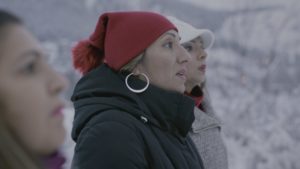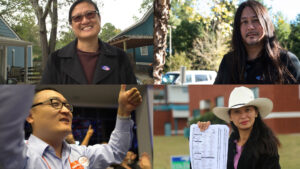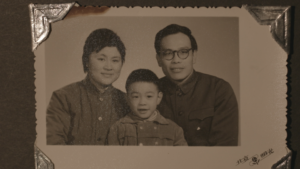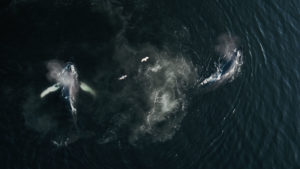Q&A with Natasha Tony: Reel Causes’ Racial Justice Curator & Leader in Inclusion Strategies
- Feb 5, 2024
- /
- 2024 Events, Blog, Building Community, Social Justice
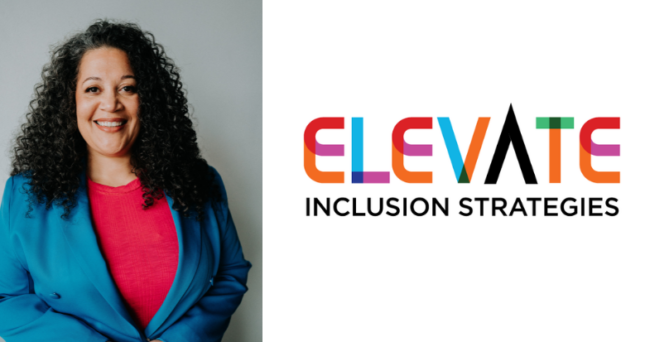
By Anson Tso
In anticipation of our upcoming event, The Revolution Will Not Be Televised on February 6th, we had the privilege of interviewing Natasha Tony, the CEO and Founder of Elevate Inclusion Strategies, who also serves as Reel Causes’ Racial Justice Curator.
Drawing from her extensive background in the film and television industry, Natasha candidly shared her journey, the significance of storytelling, and the pivotal role she plays in curating events that spark meaningful conversations.
What inspired you to take on the role of Racial Justice Curator for Reel Causes?
I love documentaries. I love storytelling. For me, the alignment with Reel Causes allows me to share stories that perhaps aren’t mainstream storytelling with audiences. There are amazing films doing the film festival circuit but perhaps aren’t mainstream – these stories need to be told in order to find ways to build connection and understanding.
I truly believe that being able to share stories with a racial justice lens through Reel Causes has allowed me to continue to explore and understand, not only for myself, but also what it means to be a racialized woman who is in the creative industries. It signifies bringing people together in community, learning from one another, being curious, and leaving an evening feeling like they’re more informed, seeing from different perspectives. It highlights the importance of continuing to build cultural awareness and incorporating that into our practice.
Reel Causes has built an opportunity for me to not only still be of service, but also stretch what it is that I do. What stories do I need to curate? Where am I on my learning journey? What feels relevant, and who is doing this work that I can introduce Reel Causes audiences to?
Can you share a memorable experience from your career that significantly influenced your commitment to diversity and inclusion?
My career in film and television was bittersweet. I probably would have taken a different path if I had the mentors and the open doors to see my potential be nurtured. Early on, whether through auditions or during my theater studies in, of all places, Regina, Saskatchewan, I was told that my size and my look wouldn’t get me work. When I moved back to British Columbia, I realized the one place where I could connect was in film and that I wanted to be a part of the storytelling.
At one point, I thought I would write and direct; that wasn’t something that I ended up doing, but working with amazing directors from the States and as an extras casting director fuelled my journey. Simply being part of the storytelling process and creating worlds that would paint pictures for people who are Black and racialized became a driving force. The opportunity to work on projects featuring Black actors and directors was something that I just wanted to be a part of. The collective experience that we shared through the process of creating worlds that Black and racialized people could see themselves in resonated deeply with me.
My advocacy for diversity and inclusion came very early in my casting journey. Commencing at the age of 20, I transitioned into casting as an assistant by the age of 26, and by 28 I was doing my own casting. One show that I had the opportunity to work on was Holiday Heart, a TV movie directed by Robert Townsend, starring Alfre Woodard. The intersectional lens was a viral component, since it was about drag queens and the adversities that the Black individuals experience. I continued to work on projects with creatives who were Black, racialized and women, including The L Word. These experiences really informed how I saw the world, how I could align social justice with storytelling, and be a part of it.
How does your background in mediation uniquely contribute to your work as a Racial Justice Curator?
In my late 30s, I put myself back to school and became a mediator where I studied coaching, conflict resolution, and labor relations, later on applying these skills as a labor relations representative for a film union. I would say that understanding the theories, concepts, and practices of being a mediator allowed for me to start thinking about how to build connections between parties that feel like they are on polar opposite ends of a point of view.
The power of the stories we tell ourselves and unpacking the dominant culture way of thinking is something that I do. I curate conversations, talk about who we are, how we want to be with one another, and create pathways to learning how to have conversations around racial equity. The curation of stories for Reel Causes has become an extension of the work that I do in opening opportunities for us to build deeper understandings of how to build a culture of accountability where our dignity, worth, and respect is present.
Reflecting on past events like Down a Dark Stairwell or One of Ours, what insights or learnings have you gained?
Simply put, it is about community and the power of storytelling. Both of those films gave space to not fear complexity when we talk about racial justice, which I feel resonates so deeply within BC when we talk about the experiences of BIPOC. The films explored intercultural communication – breaking silos.
I think that sometimes we want to paint a very simple brushstroke; that there’s only right and wrong – these ways of thinking limit us. Once we can start to explore the complexities of understanding our own identity, where we come from, and how that shapes the world from a 360-degree lens, we can begin to zoom out and understand what it means to belong and heal together. I really felt like we were able to do that in both those events.
What’s the inspiration behind creating the event in this particular way? Choice of speakers, film, book?
It was through the community! In July of 2023, Black Women in Film Canada came out west, and my company, Elevate Inclusion Strategies, hosted an event for Black women and femme identified filmmakers who wanted to meet and share a meal together. It was during this gathering that I met Tinthi Tembo. She shared her story of being in Seattle screening her film, where she met Elmer Dixon and Rick DuPree. This encounter inspired her to invite them through her non-profit organization, BIPOC-CA, for the first iteration of The Revolution Will Not Be Televised. When I learned that she wanted to bring Elmer and Rick back to BC because there was so much more to talk about from the first event, my immediate thought was, “Okay, let’s see if I can find a space for this dynamic filmmaker to bring up some more dynamic people.” That’s how this event came together; it was a beautiful alignment!
It feels like I’m curating something that has already been curated. This beautiful iteration of bringing people back together to be in community is so important. Seattle, despite not being far away, emphasizes that beyond the borders, we are all individuals who are sharing lived and historical experiences. To this day, bringing awareness to the Black Panthers and the people who started the revolution that we are talking about continues to be necessary.
Along with myself, there are African American folks that live here in British Columbia and that is part of their history. It’s part of my history as an African American woman with family ties in Philadelphia. It’s really important to be able to share that and to continue to learn and apply. We know what we’ve done in the past and what we need to be doing in the present day in order to continue to build equitable pathways.
What does the phrase “The revolution will not be televised” mean to you personally, and how does it resonate with the themes of the event?
I’ve always been hungry for history. I’ve always wanted to know more. Whether it was civil rights movements, poetry, films, reading, or music – my hunger to find my voice, be an activist, and learn about my history is what moved me.
I remember getting a book that really influenced me called Eyes on The Prize by Juan Wiliams from an activist parent of mine, Linda Sperling. The book got adapted into a PBS documentary and I recently got to interview one of the editors. It was one of those experiences where I think that in being hungry for knowledge for understanding the Black experience, and the African American Black experience, that it’s not about what’s in the media – it was truly about reshifting within to find our voice and coming together in community.
To build a revolution inspires me, Elmer and Aaron Dixon were teenagers when they started the Seattle Black Panthers chapter. When I listened to the music of Gil Scott-Heron, it was again another one of those moments in time, just like Eyes on the Prize, where my world opened up. In understanding the messages around what it is that we have to do to stand up and create change, to talk about what isn’t working has been a lot of my life’s work.
What are your personal hopes and intentions for this event?
Connection, community, and collaboration. We need to come together as a community and take care of one another – know that we aren’t fighting this alone. Being able to share stories and be with Elmer, an elder who is still doing this work, along with Rick and Tinthi, what can we learn?
The ability to continue to build community and invite people in to know that they’re not alone, that there are opportunities for us to continue to identify impacts of anti-Black racism but also be able to build, uphold, and empower are my hopes.
What do you hope attendees will take away from the event?
Empowerment, inspiration, and a sense of ongoing community. The event shouldn’t be an end but a starting point for continuous conversations, community outreach, and shared experiences. Knowledge, power, and a sense of belonging within a community are the desired takeaways.
—
On February 6th, join us for a memorable evening with Elmer Dixon, Author of Die Standing: From Black Panther Revolutionary to Global Diversity Consultant, and Rick DuPree, Director of Seattle Black Panthers Fight for Justice & Freedom.
Deep dive into history, books, and film with Natasha Tony and Tinthi Tembo as your moderators.
Event details: https://reelcauses.org/revolution-will-not-be-televised/

About Reel Causes Society
Reel Causes partners with filmmakers and Canadian causes dedicated to addressing global social justice issues. We host film screenings followed by a Q&A session to educate and inspire our community, and provide a forum for authentic conversation aroundF the issues that affect us locally.
